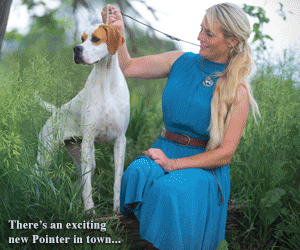Preservation Breeders – Nurturing Your Brood Bitches
408 – February 2017
BY PERI NORMAN
 One of the hallmarks of a preservation breeder is the excellent level of care provided to their dogs. Our dogs have tremendous value to us. Each individual has a contribution to make. Hopefully, many of them will contribute to their gene pools in a way that maximizes their attributes. The value of others may be what we learn from them about the disease processes that affect our dogs. This could include information about effective treatments and information about genetic transmission and environmental influences that play a role in an individual’s wellness or susceptibility to pathological conditions. Our dogs improve our lives through the emotional bond that we share and through our shared biology which makes purebred dogs excellent subjects for research on disease that affects both of our species. Preservation breeders not only do their very best to produce healthy dogs, but failing in that, maximize opportunities to utilize affected individuals in scientific studies that will provide more information for healthier future generations.
One of the hallmarks of a preservation breeder is the excellent level of care provided to their dogs. Our dogs have tremendous value to us. Each individual has a contribution to make. Hopefully, many of them will contribute to their gene pools in a way that maximizes their attributes. The value of others may be what we learn from them about the disease processes that affect our dogs. This could include information about effective treatments and information about genetic transmission and environmental influences that play a role in an individual’s wellness or susceptibility to pathological conditions. Our dogs improve our lives through the emotional bond that we share and through our shared biology which makes purebred dogs excellent subjects for research on disease that affects both of our species. Preservation breeders not only do their very best to produce healthy dogs, but failing in that, maximize opportunities to utilize affected individuals in scientific studies that will provide more information for healthier future generations.
Experienced fanciers of purebred dogs generally understand the basic elements of physical health care. These included a good quality diet, access to clean water, regular preventative veterinary care, as well as appropriate treatment for illness or injury. The impact of appropriate physical conditioning and nutrition begins long before the contemplation of any breeding. Rob Greger of Anduril Kennels, home of endurance racing Alaskan Huskies says, “The way I keep my dogs, there is virtually no pre-breeding change in diet or exercise. We strive for optimal health for all of our dogs for their whole lives.” Preservation breeders understand that the imperative of providing the very best care for our bitches is reflected in the health and vigor of their pups.
While regular veterinary care is important to all dogs, particular attention should be paid to the timing of routine veterinary care in a bitch being considered for an upcoming breeding. Particularly she should be wormed and vaccinated well in advance of the breeding. Your veterinarian can help you determine an appropriate schedule. A pre-breeding veterinary check-up may include a complete blood panel, including thyroid, a urinalysis and physical exam with specific attention to the reproductive organs. Brucellosis is on the rise with the increased importation of street dogs from foreign countries, so a brucellosis test is more important than ever. Whether your veterinarian is a boarded theriogenologist or a general practitioner, this visit would be a good time to ascertain that they are both knowledgeable and supportive of responsible dog breeding. The veterinarian’s willingness to be accessible and available around the time of whelping is a crucial component.
Click here to read the complete article408 – February 2017
Short URL: https://caninechronicle.com/?p=119810
Comments are closed











